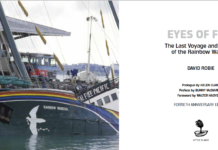THIS SLOW GOOD FRIDAY, twitter led me to one of the many national treasures available on the NZ on Screen website (itself a national treasure). It introduced me to a 2000 music video of a Baxter love poem set to music and sung by Greg Johnson: “Let Time Be Still”
It is a beautiful sight and sound production combining nostalgia for the summer of love, with an arty blue-lit, romanticised landscape. It demonstrates both the timeliness, and lyrical power and sophistication of Baxter’s poem. It provides glimpses into his rootedness in landscape, and honouring of Māori culture and tradition.
It also demonstrates a kind of masculinity that is both of its time, as well as being part of a long legacy. This can be seen in the romantic, orientalising shots of the body of a young woman with moko as passive object of desire. She is mostly shown as part of indoor rooms and city-scapes. Meanwhile, Baxter’s words paint her as part of the natural landscape, prey to the swooping falcon, slipping into the past with the changing of seasons.
The links below the video took me to excerpts from a 1997 documentary: The Road to Jerusalem: another national treasure, and is also well worth a look.
It constructs Baxter’s legacy in his rural upbringing. It sets his poems in the long tradition of romantic poets; from Robbie Burns through Byron, Keats, Blake and Wordsworth to Dylan Thomas. The natural world is a spiritual guide and resource, while cities and the alleged progress of “civilisation” are sites of everything that is destructive to this spirit and the nobility of human creativity.
[caption id="attachment_2911" align="alignleft" width="202"] James K Baxter, doing his postal round in Khandallah, Wellington, 1965. The Dominion post collection, Alexander Turnbull Library[/caption]
Clip one begins with an extract from Baxter’s “Ode to Auckland”, accompanied by a montage of overlapping images of people and locations in the city of the Muldoon era:
James K Baxter, doing his postal round in Khandallah, Wellington, 1965. The Dominion post collection, Alexander Turnbull Library[/caption]
Clip one begins with an extract from Baxter’s “Ode to Auckland”, accompanied by a montage of overlapping images of people and locations in the city of the Muldoon era:
Auckland, even when I am well stoned On a tab of LSD or on Indian grass You still look to me like an elephant’s arsehole Surrounded with blue-black haemorrhoids. The sound of the opening and shutting of bankbooks, The thudding of refrigerator doors, The ripsaw voices of Glen Eden mothers yelling at their children, The chugging noise of masturbation from the bedrooms of the bourgeoisie, The voices of dead teachers droning in dead classrooms, The TV voice of Mr Muldoon, The farting noise of the trucks that grind their way down Queen Street Has drowned forever the song of Tangaroa on a thousand beaches, The sound of the wind among the green volcanoes, And the whisper of the human heart.The clips trace Baxter’s life, as explained in the synopsis:
Readings from the poems of James K Baxter trace the poet’s life through its various New Zealand locations, and provide a biographical voice in this film by Bruce Morrison (co-written with Dr Paul Millar). Baxter’s family and friends discuss the man and his work, and the readings and beautifully shot landscapes fill in the gaps. The film won Best Documentary at the 1998 Film and TV Awards. The opening montage, describing “the chugging noise of masturbation from the bedrooms of the bourgeois” of Auckland, is seminal Baxter.In the second clip, following a piece about his father having suffered in France as a contentious objector in WWII, the reading of some of Baxter’s reflections states:
Objectively I remember my childhood as a happy time, yet a sense of grief has attached itself to my early life, like a tapeworm in the stomach of a polar bear. The sense of grief, even at times a sense of grievance helped me write poems. In a way, the poems sprang out of a quarrel with the status quo.At school, he learned to distrust “mass opinions” and to pursue his “own ideas”. This led to him feeling like a Jewish person in an anti-Semitic neighbourhood. He claims that the sense of persecution nurtured his poetry writing. The over-emphasis on Baxter’s Jerusalem years, have led to him gathering a bit of a hippy cult following. He was both of that time in the 1960s and early 1970s, and of earlier and future times, . He is part of a line of continuity a discontinuity: of a time that was still dominated by masculine culture, while also being in the tradition of rebels against the authoritarian status quo that diminishes the human spirit, and leads to the persecution of minorities: a tradition that, one way or another, will continue into the future – and hopefully will embrace racial and gender equality. –]]>





